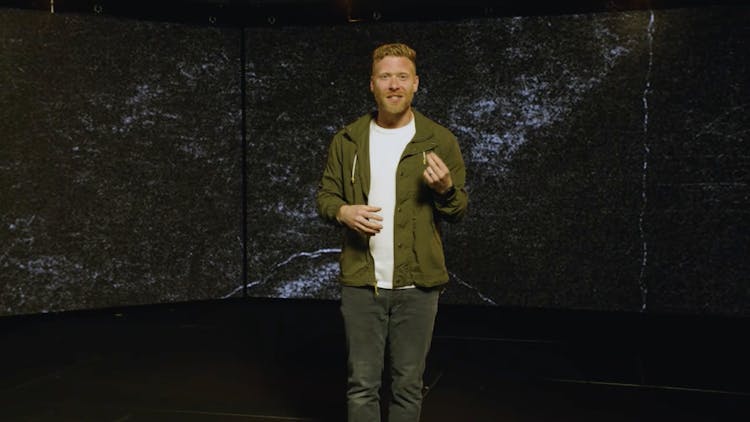Covid-19 is spiking all over the country, and along with it another round of disappointments, fear, anger, and cynicism. As it all hits record levels, here we are in the week of Thanksgiving. I find myself looking forward to anything that can provide some immunity and put an end to all of it. Gratitude feels like a tall order right now, but it’s actually been the spiritual vaccine that has saved my life in 2020.
I don’t want to be told to “count my blessings.” It feels trite and dismissive—especially when things are coming apart at the seams. When someone tells me to do that, it reminds me of when I’d go to Target with four babies, and they’d all fall apart just as someone older would say, “oh, treasure every minute with them.”
I wanted to scream, “You want me to treasure EVERY minute—like this one right now? The minute where one kid is screaming, one has poop up his back, and another one is so hungry, my boobs are leaking when she cries. Is this the minute you want me to treasure???” For a lot of us, 2020 is that kind of moment. Platitudes don’t help.
So I’m not going to tell you to count your blessings. But I am going to tell you how gratitude has rescued my heart this year.
I’m still going to be happy to say goodbye to 2020, but I’m doing it on the upswing—because of gratitude. Gratitude is not (just) a fleeting emotion we feel when someone helps us out, or something falls into place, or we catch a glimpse of a previously hidden blessing. Gratitude is much more than that.
Gratitude is a deliberate reflection that becomes our ongoing disposition. And as it does, gratitude heals.
We can deliberately inject gratitude and become vaccinated to a host of things that have caused sickness inside us in 2020. Not only my personal experience tells me this—the Bible and modern psychology are entirely cohesive: gratitude is good for us.
It’s correlated with lower stress levels, less depression, and less neuroses. (And who wouldn’t want to set down a few of those?!) It’s not just neurological health. The Bible claims gratitude as a key to spiritual health as well. Psalm 92:1 says, “It is a good thing to give thanks unto the Lord.” When God showed up in the flesh on earth as a man named Jesus, his life overflowed with gratitude in both good and bad moments, embodying the instruction in 1 Thessalonians 5:18: “In everything give thanks.” In everything! Everything means everything.
In all of what we’ve faced in 2020, we can give thanks straight through all of it. You can empower your own healing in the midst of anything with gratitude. The more I search for God in thanksgiving, the more I find him at work.
This year for me:
Gratitude has healed disappointment. Gratitude expects the work of God to continue straight through pain and loss. There was a moment I completely lost it over schools and businesses remaining closed for months on end—the loss of work for my husband, the end of my grad school graduation, the loss of opportunities for my kids they’d worked hard for. I saw how fear began to grip my neighbors. I grieved the loss of friendship interactions that helped me stay positive. Every day, it seemed like we lost more than we can ever recover. Jesus knew loss. He lost one of his closest friends. He wept over his death. And then he expressed gratitude—just before raising him from the dead! The hurt we’re all carrying from incredible loss and disappointment this year is real. Gratitude just recognizes that hurt and loss don’t diminish the power of God to resurrect absolutely anything from the dead. We can ask for it, praising the God who is able to return all that has been lost.
Gratitude has given me power over bitterness. This year has tempted me to blame God for taking things from me. I know many people have lost the lives of people they love. We’ve all lost time with grandparents and others who are at high risk of infection with Covid. Now many of us are facing emaciated holiday plans. Gratitude pushes off the bitterness that’s building up and sees ways that God is providing. Gratitude finds enough with what the world says isn’t enough. Jesus said a prayer of thanks when facing a crowd of many thousands and then offered up to God the small snack he had in his hands. God multiplied that food and fed everyone there! Gratitude looks past our poverty to a God who owns it all.
Gratitude is building immunity. Immunity is our body’s ability to resist a specific toxin upon future contact. We will be disappointed again. Lose again. Face death again. Gratitude builds trust in a God that’s bigger than those things and above all—good. “O give thanks unto the Lord; for he is good.” (Psalms 136:1). The next time we confront these things, we’re better prepared, stronger in spirit. Jesus grew in such strength and trust in the goodness of his Father that he actually said “thank-you” just before undergoing the unbelievable suffering of being killed on a cross. The more I continue to develop a disposition of gratitude, the easier I find it to resist mistrust, anger, or negativity that rises up in me. Gratitude builds immunity and incredible strength.
Thanksgiving is not just a day with some turkey—it’s an act of warfare against the illnesses that are killing our souls—disappointment, bitterness, and mistrust in God.
Let’s not make this week of gratitude something short and trite. I don’t care if you make a pretty list in a journal, grumble it under your breath, or share it at the dinner table: I just want you to take this vaccine. Fight for yourself. Go after your own emotional, mental, and spiritual health. Take back the power over the hurt and bitterness that have tried to steal all our lives this year. Let’s DO some thanksgiving and finish 2020 with a fighting chance at great health.
Process, journal or discuss the themes of this article - here's a few questions to get the ball rolling...
Is Gratitude Possible In 2020?
What strikes you most about this article? (Whatever jumps out to you might be the beginning of hearing from God. Lean into it, and see where it goes.)
How do you feel about being grateful this year? What comes easily? What are the barriers? Be as honest as you can.
If gratitude is coming easily, great! Make as long and specific a list of thanks as possible. If it’s not coming easily, you might need another step first—grief. Sometimes we need to try a different biblical idea first: Cast all of your cares upon God (because He cares for you.) Sometimes we’re so burdened by everything that isn’t working, and we need to get it all out before we can see anything else. So make a list of everything on your heart, and imagine handing it to God. Be open to hearing something from Him when you do.
0 people are discussing these questions
(This stuff helps us figure out how many fruitcakes to make come December)
You must include at least one person
Got it! Enjoy your discussion.











